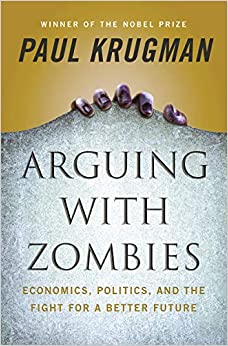You have /5 articles left.
Sign up for a free account or log in.
 Arguing With Zombies: Economics, Politics, and the Fight for a Better Future by Paul Krugman
Arguing With Zombies: Economics, Politics, and the Fight for a Better Future by Paul Krugman
Published in January 2020
In Arguing With Zombies, the Nobel Prize-winning economist Paul Krugman brings together a selection of his New York Times columns and other pieces written for a nonspecialist audience into a single volume. Krugman groups his articles along 18 themes, providing newly written introductions and transitions.
Krugman, like his intellectual hero and model John Maynard Keynes, has built a career that has reached both the heights of academia and journalism. Unlike Keynes, Krugman has spent little time in government making policy and instead has occupied an enormous place of influence on the left with his books and his decades-long perch at the Times. I’ve been reading Krugman since I was a graduate student. His 1995 Peddling Prosperity left a deep mark on my thinking. Since 1999, I’ve been reading Krugman in the Times and wherever else his writing appears.
There are two ways that I want to discuss with you about Arguing With Zombies.
The first is to discuss the book on its merits. I hesitated in reading Arguing With Zombies, as I wondered what the value add would be for a regular reader of Krugman’s columns. Surprisingly, the book works really well. The pieces that Krugman has chosen to include have aged well. Grouping the columns under themes related to health care, economic policy and politics end up being enormously helpful in helping the reader go more deeply into each topic.
Even those who virulently disagree with Krugman’s politics would have trouble disputing his skills as a writer. Krugman’s gift is to simplify complex topics in the context of the development of persuasive arguments. Readers on the moderate to progressive ideological perspective will find Arguing With Zombies an edifying, enjoyable and satisfying read.
The second way that I want to talk with you about Arguing With Zombies is to ask how a Republican might read this book.
The thing is, I sort of doubt that many Republicans will read this book. That makes talking about Arguing With Zombies with our Republican colleagues in this space -- and we have many Republican colleagues on Inside Higher Ed -- a challenge.
Our Inside Higher Ed community is politically and ideologically diverse. One persistent myth about higher education is that it is a liberal bastion. Yes, Democrats are overrepresented among professors -- and as an industry, academia is definitely to the left of other industries. But those averages operate within a broader context of political and ideological diversity.
Krugman believes that Republicans today are operating in bad faith. He argues against the efforts of journalists to find the middle ground, as he thinks that instinct to seek moderation ignores the reality of how far to the right the Republican Party has traveled. On every issue, from climate change to health care to taxation, Krugman believes that the Republicans are sold out to the wealthy. He sees the populist rhetoric of Trump as mostly a scam, designed to cover up policies that hurt the working class while benefiting the rich.
Krugman is much smarter than I am. Way more professionally, intellectually and academically accomplished than I’ll ever be. I understand that his goal is to provide the left with a clear intellectual framework and a set of core policy recommendations backed by economic theory and research.
Still, there is something in me that has trouble with rhetoric that leaves little room for listening.
Unlike Krugman, I don’t believe that Republicans -- or at least the Republicans who are part of our Inside Higher Ed community -- are acting in bad faith.
Academic Republicans believe in higher education as an engine of opportunity. They want our colleges and universities to do everything possible to enhance the life chances of our students. Republicans may disagree on the best way to accomplish those goals, putting less stock in the role of government and public investment and more faith in market mechanisms and individual initiative.
Learning from Republicans in academia, and listening to academics who support Trump, does not mean that we have to agree with them. No more than they would agree with us. Listening does not equate with the necessity of meeting in the middle. We can learn the most from people we disagree with.
Could Krugman be as brilliant in his economic and political analysis if he was more generous to the motivations and ideas of the right?
Would any of the power of Krugman’s ideas be lost if he was willing to start from the idea that his political and ideological opponents were arguing from good faith?
How might we engage in a dialogue with Republicans over the ideas in Arguing With Zombies?
What are you reading?




